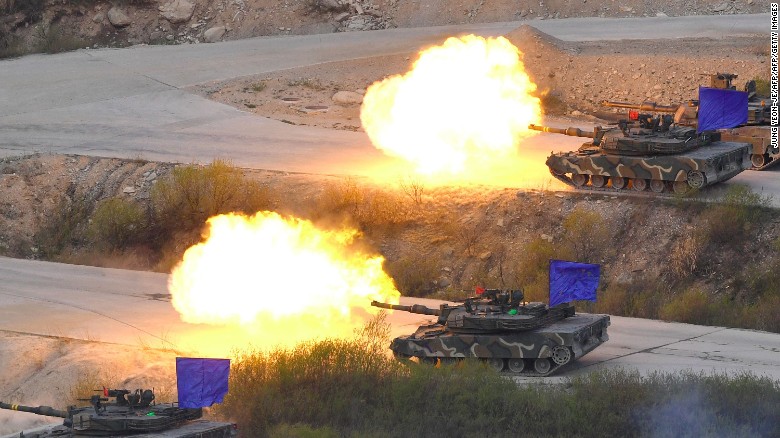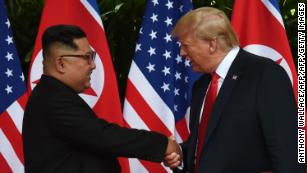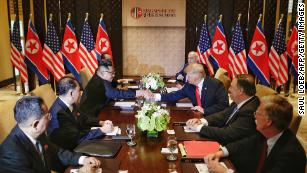Trump admin expected to suspend August US-S. Korea drill as Pentagon scrambles
(CNN)The Trump administration is expected to announce the formal suspension of planning for major August multilateral military drills on the Korean Peninsula as soon as Thursday, according to several administration officials with knowledge of White House, State Department and Defense Department planning on how to carry out President Donald Trump's decision announced at the Singapore summit.
Detailed Pentagon guidance is expected this week on carrying out Trump's decision to suspend so-called "war games" with South Korea. The Pentagon's post-Singapore involvement in this issue is raising questions about whether the President sought military advice ahead of making his decision.
As the dust settles from the historic summit, some details about how Trump got the idea to offer a suspension of military exercises to North Korean leader Kim Jong Un are becoming clearer.
Ending the US-South Korea war games would be a win for Beijing
A source familiar with the matter pushed back on the idea that Trump got the idea to halt joint exercises from Russian President Vladimir Putin. The source said that, if anything, it's something that came from Chinese President Xi Jinping, who has been very vocal about it and has had direct conversations with Trump about the matter. The term "war games" was also a term coined by China and North Korea.
The source said halting the joint exercises was one of "many tools in the tool box" that the President took with him to meet with Kim but the final decision on what concession or concessions he would make wasn't determined until he was able to size up Kim. He told his top advisers before going in that he wanted to see where the meeting would go, and in the end he felt Kim was being genuine so he was willing to wheel and deal.
"It was a game-time decision," the source says.
That decision seemed to have caught parts of the military by surprise. A US defense official told CNN on Tuesday, hours after the announcement, that they had "received no updated guidance on execution or cessation of training exercises," including the next big one in late August. The official said the military would continue its current coordination and work with South Korea until told otherwise.
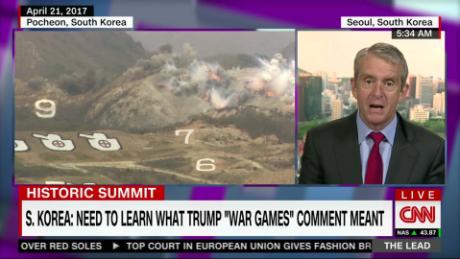
Play Video
S. Korea security adviser: Not up to Trump to end drills
An administration official familiar with the matter said members of the administration aboard Air Force One's return trip to Washington were unhappy with the initial Pentagon reaction to the suspension, saying it wasn't supportive enough. The official said at some point that sentiment was conveyed to the Pentagon. It is unclear how or exactly when it was communicated. But two other administration officials told CNN that by Wednesday morning it was clear to defense officials the White House was unhappy.
Defense Secretary James Mattis, along with the chairman of the Joint Chiefs of Staff, Gen. Joseph Dunford, and top commanders are trying to fashion detailed directives to the military on what exact exercises and drills will be suspended, several US officials told CNN. A major challenge, according to these officials, is to turn Trump's broad intentions into detailed military guidance. For example, they say the notion of "war games" is not a specific military term, so the Pentagon has to determine exactly what Trump wants to have happen.
Officials continue to reiterate that all exercises are defensive in nature, even as Trump called them "provocative" -- a word out of the North Korean playbook.
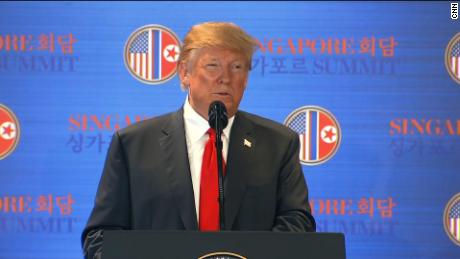
Play Video
Trump: We will stop 'war games'
More than 24 hours after the summit ended, no one in the administration would openly say to what extent Mattis had been consulted before the decision to cancel exercises. At a news conference in Seoul, Secretary of State Mike Pompeo was asked if the Pentagon and the South Koreans had been asked for their views.
"I'm not going to talk to internal processes and discussions that were had," he said.
The Defense Department chief spokesperson told reporters Tuesday that Mattis "was not surprised. He was consulted." But several senior defense officials could not confirm Mattis knew of the decision well in advance and what advice, if any, he had an opportunity to offer Trump on a key military matter.
Pompeo did offer more of Trump's reasoning on the exercise decision in Singapore.
"He made very clear that the condition precedent for the exercises not to proceed was productive, good-faith negotiations being ongoing and at the point it's concluded that they're not, the President's commitment to not have those joint exercises take place will no longer be in effect," Pompeo said. "He was unambiguous about that."
The suspension is "a show of good faith" in the North Korean negotiations, said another administration official. However, the White House is continuing to draw the distinction that "readiness training and training exchanges" will continue.
But US military officials point out exercises often involve thousands of troops and months of planning, making it difficult to quickly restart them once suspended or canceled.
Trump seemingly justifies brutal actions by Kim and says he's 'very smart'
The August exercise, named Ulchi Freedom Guardian, has long been scheduled and final planning with several nations' military forces is well underway. In 2017, the annual exercise involved 17,500 US service members, with 3,000 coming from outside South Korea. The drills include both high-level commanders in computer-simulated defensive exercises and units in the field, all practicing readiness under a scenario in which the Korean Peninsula goes from peace to a crisis stage and then into open conflict, according to a defense official.
Suspending the exercise has deep implications for Mattis' relationships with defense ministers across the region.
Australia, Canada, Columbia, Denmark, New Zealand, the Netherlands and the United Kingdom have all participated in the drill in the past.
Another indicator that the allies were unaware of Trump's decision was the quick statement from the South Korean government that they were trying to determine what the President's announcement meant. Several defense officials told CNN there is concern some allies may believe Mattis and the Trump administration were keeping important decisions from them and sharing information first with Kim.
News Courtesy: www.cnn.com

